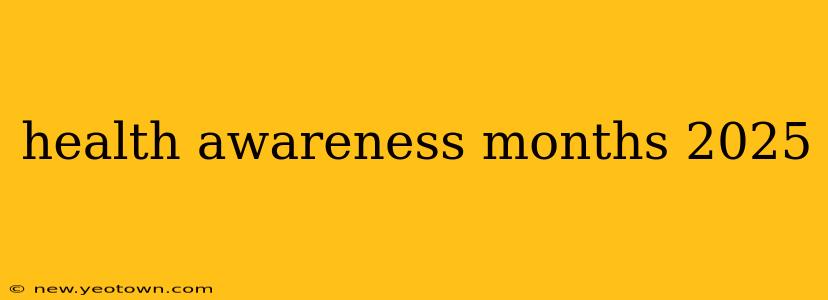2025 promises to be another year dedicated to raising awareness about crucial health issues. Each month brings a focus on a specific area, offering opportunities for self-reflection, education, and proactive health management. Let's embark on a journey through the year, exploring the significant health awareness months and how you can participate. While specific campaigns and themes may vary slightly depending on the organization, the overarching focus remains consistent.
This isn't just a list; it's a roadmap to a healthier you and a healthier community. Let's dive in!
January: National Glaucoma Awareness Month
January kicks off the year with a vital focus on eye health. Glaucoma, a leading cause of blindness, often develops silently. Early detection is key to preserving your vision. This month is a powerful reminder to schedule your comprehensive eye exam. Don't wait until you notice symptoms – proactive care is your best defense.
What are the risk factors for Glaucoma?
Risk factors for glaucoma include family history, age (over 60), African American ethnicity, and certain medical conditions like diabetes and high blood pressure.
February: American Heart Month & National Cancer Prevention Month
February hits hard with two crucial health awareness campaigns. American Heart Month emphasizes cardiovascular health, reminding us to prioritize diet, exercise, and regular check-ups. Heart disease remains a significant global health concern, but lifestyle changes can make a considerable difference. Simultaneously, National Cancer Prevention Month urges us to adopt healthy habits that reduce cancer risk. This includes screenings, regular exercise, a balanced diet, and avoiding tobacco products.
How can I reduce my risk of heart disease?
Reducing your risk of heart disease involves a multifaceted approach, including regular exercise, a balanced diet low in saturated and trans fats, managing blood pressure and cholesterol, and avoiding smoking.
March: National Colorectal Cancer Awareness Month
March shines a light on colorectal cancer, a highly preventable and treatable disease when detected early. This month is a strong call to action for regular screenings, particularly for individuals over 50 or those with a family history of the disease. Understanding the symptoms and seeking medical attention promptly are essential.
What are the symptoms of colorectal cancer?
Symptoms of colorectal cancer can include changes in bowel habits, blood in the stool, persistent abdominal discomfort, unexplained weight loss, and fatigue. It's crucial to consult a doctor if you experience these symptoms.
April: National Autism Awareness Month & Stress Awareness Month
April brings a dual focus on National Autism Awareness Month and Stress Awareness Month. Autism awareness strives to increase understanding and acceptance of individuals on the autism spectrum. Simultaneously, Stress Awareness Month underscores the importance of managing stress effectively to protect mental and physical health. Learning healthy coping mechanisms is vital for overall well-being.
How can I manage stress effectively?
Effective stress management techniques include exercise, mindfulness practices like meditation or yoga, sufficient sleep, a balanced diet, and connecting with a support system.
May: National Physical Fitness and Sports Month
May encourages us to prioritize physical activity. Regular exercise is vital for both physical and mental health. This month is a reminder to find activities you enjoy and make them a regular part of your routine.
June: National Men's Health Month
June is dedicated to raising awareness about men's health issues, emphasizing preventative care and early detection. Many conditions, such as prostate cancer and heart disease, affect men disproportionately. This month urges men to prioritize their health and engage in regular check-ups.
July: National Cleft and Craniofacial Awareness Month & Minority Mental Health Awareness Month
July combines awareness of National Cleft and Craniofacial Awareness Month with Minority Mental Health Awareness Month. Craniofacial conditions affect the skull, face, and jaws, and this month aims to increase understanding and support for those affected. Simultaneously, the focus on minority mental health highlights the unique challenges faced by minority groups in accessing and receiving adequate mental healthcare.
August: National Immunization Awareness Month & National Breastfeeding Month
August combines two vital health initiatives: National Immunization Awareness Month and National Breastfeeding Month. Immunization protects individuals and communities from preventable diseases, while breastfeeding supports the health of both mother and baby.
Why is immunization important?
Immunization is crucial for preventing the spread of infectious diseases and protecting vulnerable populations. It is a cornerstone of public health.
September: National Childhood Obesity Awareness Month & National Preparedness Month
September combines National Childhood Obesity Awareness Month and National Preparedness Month. The former highlights the increasing prevalence of childhood obesity and the importance of promoting healthy lifestyles in children. The latter focuses on personal and community preparedness for emergencies.
October: National Breast Cancer Awareness Month & Domestic Violence Awareness Month
October tackles two significant health concerns: National Breast Cancer Awareness Month and Domestic Violence Awareness Month. Breast cancer awareness focuses on early detection through self-exams and mammograms. Domestic violence awareness aims to raise awareness and support victims.
November: National Diabetes Awareness Month & National Family Caregivers Month
November features National Diabetes Awareness Month and National Family Caregivers Month. Diabetes awareness emphasizes early detection and management of this chronic condition. National Family Caregivers Month highlights the crucial role of family caregivers and emphasizes support and resources for caregivers.
December: National Influenza (Flu) Vaccination Week
December emphasizes the importance of getting a flu vaccination to protect against influenza. The flu season typically peaks during winter months. Vaccinations are a critical tool for community protection.
Remember, these awareness months aren't just about raising awareness; they are a call to action. Take advantage of this yearly calendar of health opportunities to prioritize your well-being and the well-being of your loved ones. Stay informed, take proactive steps, and make 2025 a year of healthy choices.

